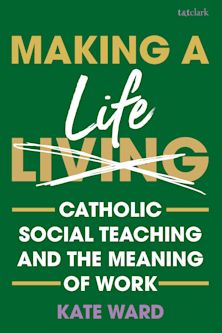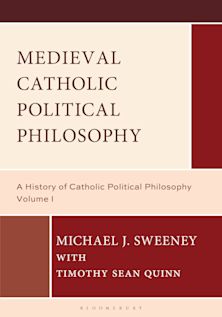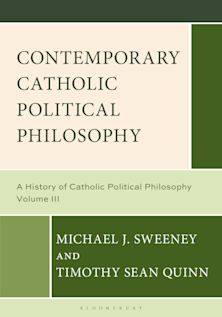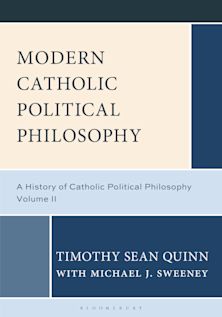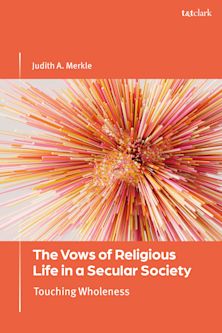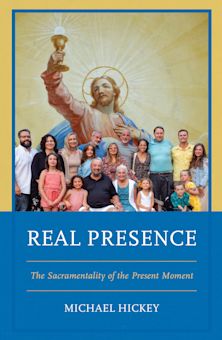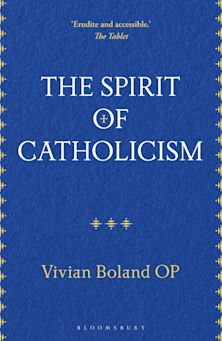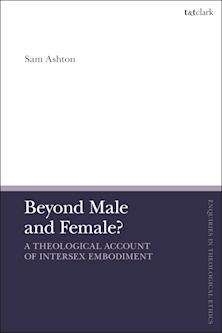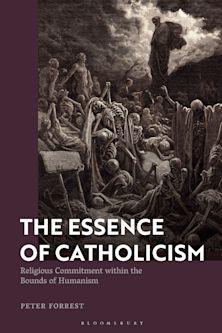- Home
- ACADEMIC
- Theology
- Catholic Theology
- Ontological and Historical Dimensions of Salvation According to Joseph Ratzinger
Ontological and Historical Dimensions of Salvation According to Joseph Ratzinger
To Identity through History
Ontological and Historical Dimensions of Salvation According to Joseph Ratzinger
To Identity through History
This product is usually dispatched within 1 week
- Delivery and returns info
-
Free US delivery on orders $35 or over
You must sign in to add this item to your wishlist. Please sign in or create an account
Description
For Joseph Ratzinger, the separation between ontology and history constitutes the crucial problem that underlies all the difficulties of contemporary dogmatic theology since it affected the original unity of two essential dimensions of Christian revelation. This study delves into Joseph Ratzinger's approach to the problem, his account of the path that led to this separation, and into some key insights, drawn from his understanding of human salvation that could contribute to overcoming this dichotomy that afflicts contemporary theology.
Through the study of Joseph Ratzinger's writings, Troconis highlights the relational and existential character of the theology of one of the best-known and most influential Catholic thinkers of our time.
Table of Contents
Introduction
CHAPTER 1
The Question
CHAPTER 2
Man's Salvation as the "Return to Himself"
CHAPTER 3
Man as Imago Dei
CHAPTER 4
God, The World and Time
CHAPTER 5
Jesus Christ as Imago Dei Perfecta
CHAPTER 6
The Fulfillment of the "Return to Self"
Conclusions
Bibliography
Index
Product details
| Published | Aug 21 2025 |
|---|---|
| Format | Hardback |
| Edition | 1st |
| Extent | 176 |
| ISBN | 9780567719126 |
| Imprint | T&T Clark |
| Dimensions | 9 x 6 inches |
| Series | T&T Clark Studies in Ressourcement Catholic Theology and Culture |
| Publisher | Bloomsbury Publishing |
About the contributors
Reviews
-
In this superb volume, Troconis serves as a true guide to Ratzinger's highly nuanced, broadly sourced and intellectually complex writings. Her book is at once an accessible yet trenchant. It provides precise analyses of Ratzinger's works and spells out numerous implications of the themes of ontology, time, salvation and history with acumen. The book attends to key Christian doctrinal loci that have preoccupied Ratzinger, in dialogue with other modern theologians. An illuminating and persuasive study!
Paul Allen, Corpus Christi College, Canada
-
For two centuries, Catholic theology has been haunted by the contrast between metaphysics, with its focus on the unchanging foundational structures of reality, and theology, with its concern for the historical sweep of salvation history from creation to redemption. How does one integrate the permanent and changing within an understanding of how the God who transcends history enters history for our salvation? This question is a thread running through the theology of Joseph Ratzinger and Isabel Troconis carefully expounds the way Ratzinger addresses the problem through the lens of the saving person and work of Christ. She skillfully brings together material from the entire corpus of Ratzinger's writings to show how he offers a model for bringing Athens and Jerusalem together.
Michael Root, Catholic University of America, USA
-
Although written in English, one of the strengths of this study is that Troconis brings to it a facility in multiple languages, enabling her to draw upon research into Ratzinger's theology in German, Spanish, Italian, and French. Furthermore, her ability to read Ratzinger's work in its original language means that she has accessed texts either difficult to find or unavailable in English, and regularly picks up nuances in meaning that are lost in translations into English. In other words, she has been able to study the whole of Ratzinger's oeuvre that is relevant to the question of the relation between history and ontology in his soteriology, and study it more immediately than people who do not understand German. Not only is her study of this theme detailed and coherent; it makes a valuable contribution to understanding a theme that lies at the heart of the whole of Ratzinger's theologizing.
Peter J. McGregor, Catholic Institute of Sydney, Australia
-
This is an excellent example of depth, balance and clarity. Troconis presents the analysis of Ratzinger's Christological anthropology against the backdrop of the question of the (relational, not
dialectical) relationship between metaphysics and (personal) history. This is a topic of great interest, exploring the confrontation of Catholic theology with the challenges of the postmodern age.Giulio Maspero, Pontifical University of the Holy Cross, Italy
-
Few issues have vexed the XX-century theological landscape more than the efforts made to combine the fixed with the changeable, the ontological with the historical, being with action. Many authors have attempted to bring a metaphysics that adequately reflects divine and human nature, into contact with the history of salvation, made manifested in the life, death and Resurrection of Jesus Christ. Among them, an important position is occupied by Joseph Ratzinger. Troconis, in this clear and carefully crafted work, has successfully shown how Ratzinger harmonizes the historical and ontological aspects of salvation. Insofar as human fulfilment (or salvation) consists in interpersonal communion with the Trinity, and such a communion involves a union of wills in charity, humans can only attain ontological fulfilment through history.
Paul O'Callaghan, Pontifical University of the Holy Cross, Italy

ONLINE RESOURCES
Bloomsbury Collections
This book is available on Bloomsbury Collections where your library has access.












